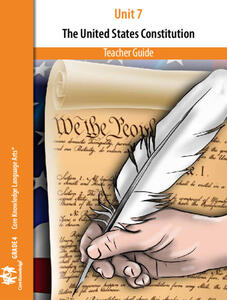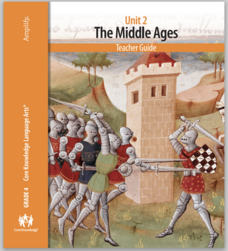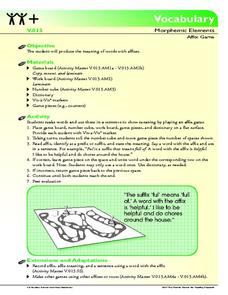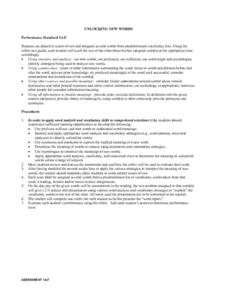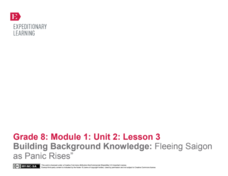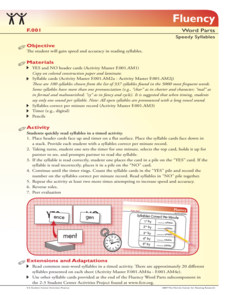Core Knowledge Foundation
Unit 8: Native Americans
Over five weeks, fifth graders listen to and discuss reading passages that explore the connection between Native Americans and nature. Following daily readings, scholars practice word work, including prefixes, root words, suffixes,...
Core Knowledge Foundation
Unit 6: The Reformation
Over three weeks, fifth graders read about and discuss the Reformation which saw religion and politics shift across Europe. Following daily readings, young scholars practice spelling, grammar, and morphology skills such as prefixes,...
Core Knowledge Foundation
Unit 4: The Renaissance
The Renaissance is the theme of a five-week unit designed to boost reading comprehension, spelling, vocabulary, and expository writing skills. Scholars listen to and discuss daily readings and engage in skills practice activities...
Core Knowledge Foundation
Unit 2: Early American Civilizations
Fifth graders explore early American civilizations in a four-week ELA unit. Every lesson offers an opportunity to read and discuss a selected passage followed by word work that covers vocabulary, grammar, and morphology. Learners write...
Core Knowledge Foundation
Unit 8: Treasure Island
Treasure Island by Robert Louis Stevenson is the focus of the final unit, emphasizing reading, writing, grammar, morphology, and spelling. Fourth graders read and discuss a chapter with every lesson, followed by word work—prefixes,...
Core Knowledge Foundation
Unit 7: The United States Constitution
Fourth graders delve into the United States Constitution in a unit designed to boost reading comprehension, grammar, and writing. During each lesson, scholars read through and discuss a new chapter and work with prefixes and verbs....
Core Knowledge Foundation
Unit 6: American Revolution
The American Revolution is the theme of a five-week unit that focuses on reading, grammar, morphology, and writing. Scholars read and respond to texts, practice spelling and word work, and write paragraphs. Assessments gauge comprehension.
Core Knowledge Foundation
Unit 2: The Middle Ages
Over four weeks, fourth graders read and discuss texts about the Middle Ages. They practice vocabulary, spelling, and grammar, such as nouns, adjectives, and verbs. Writing opportunities allow learners to boost their note-taking skills...
Core Knowledge Foundation
Third Grade Skills Unit 11: Introduction to Ecology
The concluding skills unit offers learning opportunities and reviews in preparation for assessments. Scholars participate in lessons that examine spelling patterns, prefixes, suffixes, pronouns, and adjectives, draft a letter, and listen...
Core Knowledge Foundation
Third Grade Skills Unit 10: Living in Colonial America
Over three weeks, third graders participate in lessons designed to boost spelling and grammar skills—adjectives, adverbs, and pronouns—and prefixes. Readings are themed to share stories about Colonial America.
Core Knowledge Foundation
Third Grade Skills Unit 9: The Age of Exploration
The Age of Exploration is the theme of a unit designed to boost third-grade ELA skills. Scholars practice spelling patterns, examine words with prefixes and suffixes, build sentences with linking words, and use comparative and...
Core Knowledge Foundation
Third Grade Skills Unit 3: How Does Your Body Work?
A skills unit combines ELA and science with lessons that explore the human body. Lessons begin with a reading, go into skills practice, and offer take-home materials. Skills practice includes listening to and discussing a read-aloud,...
Core Knowledge Foundation
Third Grade Skills Unit 2: Rattenborough’s Guide to Animals
An animal-themed unit focuses on third-grade skills. Scholars practice spelling patterns, prefixes, suffixes, and grammar concepts—nouns, verbs, adjectives, subjects, predicates, and sentences. Assessments gauge proficiency.
Florida Center for Reading Research
Vocabulary Morphemic Elements: Affix Game
How well do you know your affixes? Find out how proficient your learners are with a game that requires them to define various affixes and use them to create words that will go into sentences.
Curated OER
Vocabulary Building
A fabulous language arts activity has readers focus on the vocabulary in the key words, expand and build new vocabulary, and practice three grammar concepts. They recognize key words as they relate to communicating at work. Pupils build...
Curated OER
Unlocking New Words: Partner Presentations
Following extensive modeling about how to apply word analysis and vocabulary skills to learn new words, partner teams create brief word presentations to teach new vocabulary to the class. Preselect words from upcoming social studies,...
Curated OER
It's Not All Greek to Me
Learners find out the meaning for prefixes used in math vocabulary. By dissecting words used in everyday math, they figure out what the prefix indicates and what the word means. A variety of well-organized worksheets and activities...
Curated OER
Prefixes
Understanding what prefixes are, why they are used, and how they change the meaning or purpose of words, are the focuses of this language arts presentation. A lot of valuable practice is embedded in each of the 19 slides. Pupils are...
EngageNY
Introducing the Process for Close Reading: Meeting Frederick Douglass
To learn more about Frederick Douglass, class members complete close reads of excerpts from Narrative of the Life of Frederick Douglass. They complete a close reading guide and questions for each excerpt. Pupils then add to the...
EngageNY
Building Background Knowledge, Predicting, and Focusing on Key Vocabulary: “Refugees: Who, Where, Why”
Using the fourth of 20 lessons from the Grade 8 ELA Module 1, Unit 2 series, scholars discuss refugees' challenges when finding a place to call home. They also read and answer text-based questions about the informational passage...
EngageNY
Building Background Knowledge: "Fleeing Saigon as Panic Rises”
How can scholars better understand the refugee experience? Pupils read Fox Butterfield's article "Panic Rises in Saigon, but the Exits are Few" and connect it to the novel Inside Out & Back Again. They annotate the text, looking for...
Florida Center for Reading Research
Fluency: Word Parts, Speedy Syllables
Prefixes, affixes, roots, and word parts are the focus of a lesson designed to boost scholars' speed and accuracy. Peers work collaboratively to time one another while reading word cards. Answers, scores, and times are recorded to track...
Penguin Books
An Educator's Guide to Matilda
Chances are, you've got some precocious Matilda fans in your class! Use a thorough set of lesson plans to address Roald Dahl's classic novel about a bright girl who just wants to be understood. Vocabulary exercises, comprehension...
Meadows Center for Preventing Educational Risk, University of Texas at Austin
Lesson 11 - Affixes with Unchanging Base Words
Adding an affix to a word sometimes changes its meaning, just like magic. Using 11th of 17 lessons in the Word Recognition and Fluency series, readers become vocabulary magicians, learning to form and decode words that contain common...







